See also
- John Joannopoulos, fellow MIT physicist and collaborator of Kolodziejski's
- List of emerging material science technologies
- List of Massachusetts Institute of Technology faculty
- Materials science
- Women in physics
Leslie Ann Kolodziejski | |
|---|---|
| Born | July 31, 1958 |
| Alma mater | Purdue University |
| Known for | Photonics Molecular-beam epitaxy |
| Awards | Presidential Young Investigator Award |
| Scientific career | |
| Institutions | Purdue University Massachusetts Institute of Technology |
Leslie Ann Kolodziejski (born July 31, 1958) is an American professor of electrical engineering at the Massachusetts Institute of Technology. She works on fabricating novel photonic devices after synthesizing the constituent material via molecular-beam epitaxy. She is a recipient of the Presidential Young Investigator Award from the National Science Foundation and is a fellow of The Optical Society.
Kolodziejski earned her undergraduate and graduate degrees at Purdue University, completing her bachelor's degree in 1983 and Master's in 1984. [1] She received her Ph.D. from Purdue University in 1986, where she worked on molecular-beam epitaxy. [2] [3]
Kolodziejski joined the Electrical and Computer Engineering Department at Purdue University as an assistant professor in 1986. [4] She was awarded the National Science Foundation Presidential Young Investigator Award from 1987 to 1993 for researching potential uses of molecular-beam epitaxy with photo-excitation, for designing more efficient doping processes of zinc selenide and for studying the resulting product's properties. [5] [6] A simultaneous United States Naval Research Laboratory Fellowship was awarded in 1989 to determine the optimum growth parameters for the chemical beam epitaxy of zinc selenide and comparing the product specifications with that obtained via molecular beam epitaxy. [7] [8]
She moved to the Massachusetts Institute of Technology (MIT) in 1988 to continue to work on epitaxial deposition. [9] [10] In 1992, Kolodziejski was appointed to the Karl van Tassel Career Development Chair and in 1993, to the Esther and Harold E. Edgerton Career Development Chair. [11] Kolodziejski was made full professor in the faculty of electrical engineering and computer science (EECS) in 1999, where she currently teaches at both undergraduate and postgraduate level while leading the Integrated Photonic Devices and Materials Group and the Nanoprecision Deposition Laboratory. [12] [13]
Kolodziejski has served on the editorial boards of Applied Physics Letters and the Journal of Applied Physics . [13] She is a member of the Truth Values Community, which looks to create a better community for women graduate students at MIT through a pairing of science and arts. [14] She is also the founder of Leaders in Life, an organization which works to foster leadership among women graduate students. [12]
In 2015, Kolodziejski was awarded an Alfred P. Sloan Foundation award to create a University Centre of Exemplary Mentoring. [15] She is also a mentor for the Minority PhD program (MPhD). [16] [17]
In 2011, Kolodziejski was elected as a fellow of The Optical Society. [13] [18] She was the recipient of the Faculty Ambassador Award, which recognizes "enhancing the experience for students at MIT that transcends the boundaries of the classroom" as well as enthusiastic support for multiculturalism and diversity. [19] Other awards and recognition include:
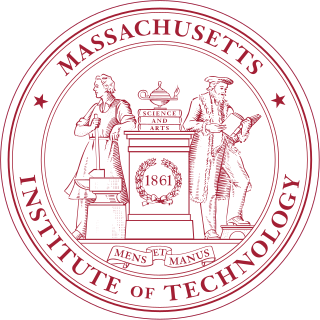
The Massachusetts Institute of Technology (MIT) is a private land-grant research university in Cambridge, Massachusetts. Established in 1861, MIT has played a significant role in the development of many areas of modern technology and science.
AVS: Science and Technology of Materials, Interfaces, and Processing is a not-for-profit learned society founded in 1953 focused on disciplines related to materials, interfaces, and processing. AVS has approximately 4500 members worldwide from academia, governmental laboratories and industry.
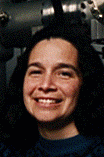
Maria C. Tamargo is a leading Cuban-American scientist in compound semiconductors and materials science. She is a professor of chemistry at The City College of New York.
The Presidential Young Investigator Award(PYI) was awarded by the National Science Foundation of the United States Federal Government. The program operated from 1984 to 1991, and was replaced by the NSF Young Investigator (NYI) Awards and Presidential Faculty Fellows (PFF) program. In 1995, the NSF Young Investigator program was subsumed into the NSF CAREER Awards program, and in 1996, the Presidential Faculty Fellows program was replaced by the PECASE program.

Jillian Lee Dempsey is an American inorganic chemist and the Bowman and Gordon Gray Distinguished Term Professor at the University of North Carolina at Chapel Hill. Currently, her work focuses on proton-coupled electron transfer, charge transfer events, and quantum dots. She is the recipient of numerous awards for rising stars of chemistry, including most recently a 2016 Alfred P. Sloan Research Fellowship and a 2016 Air Force's Young Investigator Research Program (YIP).
Manijeh Razeghi is an Iranian-American scientist in the fields of semiconductors and optoelectronic devices. She is a pioneer in modern epitaxial techniques for semiconductors such as low pressure metalorganic chemical vapor deposition (MOCVD), vapor phase epitaxy (VPE), molecular beam epitaxy (MBE), GasMBE, and MOMBE. These techniques have enabled the development of semiconductor devices and quantum structures with higher composition consistency and reliability, leading to major advancement in InP and GaAs based quantum photonics and electronic devices, which were at the core of the late 20th century optical fiber telecommunications and early information technology.
Janet Marie Conrad is an American experimental physicist, researcher, and professor at MIT studying elementary particle physics. Her work focuses on neutrino properties and the techniques for studying them. In recognition of her efforts, Conrad has been the recipient of several highly prestigious awards during her career, including an Alfred P. Sloan Research Fellow, a Guggenheim Fellow, and the American Physical Society Maria Goeppert-Mayer Award.
Chekesha M. Liddell Watson is an Associate Professor of Material Science and Engineering at Cornell University. She researches colloidal materials, and the relationship between micron and submicron length scales.
Tamara Ann Broderick is an American computer scientist at the Massachusetts Institute of Technology. She works on machine learning and Bayesian inference.
Kai-Mei Fu is an American electrical engineer and physicist. They are an Associate Professor of Physics and Electrical Engineering at the University of Washington where they are the director of the Optical Spintronics and Sensing Lab.
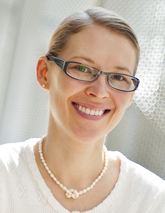
Alexandra Boltasseva is Ron And Dotty Garvin Tonjes Distinguished Professor of electrical and computer engineering at Purdue University, and editor-in-chief for The Optical Society's Optical Materials Express journal. Her research focuses on plasmonic metamaterials, manmade composites of metals that use surface plasmons to achieve optical properties not seen in nature.
Cardinal Warde is a Professor of Electrical Engineering at Massachusetts Institute of Technology. He works on optoelectronic materials for information processing, communications and holography. Warde is involved with education policy in the Caribbean, acting as a scientific advisor for the Government of Barbados and helping high school students access science education.

Carmiña Londoño emeritus Deputy Division Director of the Electrical Communications and Cybersystems Division at the National Science Foundation. She previously spent 13 years at the National Institute of Standards and Technology, where she led the Global Standards and Information Group. Dr. Londoño spent two terms on the Board of Directors of SPIE, and the SPIE's Director's Award in 2019.
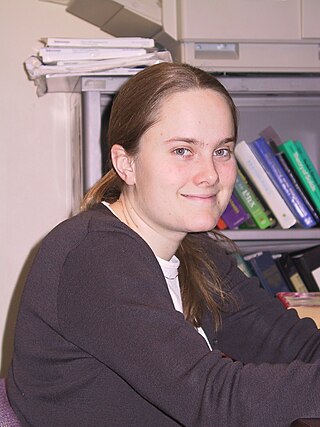
Michelle Povinelli is a Professor of Electrical Engineering and Physics and Astronomy at the University of Southern California (USC) and Fellow of the OSA and SPIE. Povinelli's research in nanophotonics focuses on the behavior of light inside complex materials.

Jennifer (Jen) Dionne is an American scientist and pioneer of nanophotonics. She is currently senior associate vice provost of research platforms at Stanford University, a Chan Zuckerberg Biohub Investigator, and an associate professor of materials science and engineering and by courtesy, of radiology. She serves as director of the Department of Energy's "Photonics at Thermodynamic Limits" Energy Frontier Research Center (EFRC), which strives to create thermodynamic engines driven by light, and she leads the "Extreme Scale Characterization" efforts of the DOE's Q-NEXT Quantum Science Center. She is also an associate editor of the ACS journal Nano Letters. Dionne's research develops optical methods to observe and control chemical and biological processes as they unfold with nanometer scale resolution, emphasizing critical challenges in global health and sustainability.

Hui Cao (曹蕙) is a Chinese American physicist who is the professor of applied physics, a professor of physics and a professor of electrical engineering at Yale University. Her research interests are mesoscopic physics, complex photonic materials and devices, with a focus on non-conventional lasers and their unique applications. She is an elected member of the US National Academy of Sciences and of the American Academy of Arts and Sciences.

Prineha Narang is an American physicist and computational material scientist. She is a Professor of Physical Sciences and Howard Reiss Chair at the University of California, Los Angeles (UCLA). Narang currently serves as a U.S. Science Envoy approved by the Secretary of State to identify opportunities for science and technology cooperation. Before moving to UCLA, she was first an Environmental Fellow at Harvard University Center for the Environment and then an Assistant Professor in the John A. Paulson School of Engineering and Applied Sciences at Harvard University. Narang’s work has been recognized internationally by many awards and a variety of special designations, including the Mildred Dresselhaus Prize, the 2021 IUPAP Young Scientist Prize in Computational Physics, a Friedrich Wilhelm Bessel Research Award from the Alexander von Humboldt Foundation, and a Max Planck Sabbatical Award from the Max Planck Society. Narang also received a National Science Foundation CAREER Award in 2020, was named a Moore Inventor Fellow by the Gordon and Betty Moore Foundation for the development for a fundamentally new strategy for single molecule sensing and environmental toxin metrology using picoscale quantum sensors, CIFAR Azrieli Global Scholar by the Canadian Institute for Advanced Research, and a Top Innovator by MIT Tech Review. Narang was awarded a Guggenheim Fellowship in 2023.
Jesse Thaler is an American particle physicist who is a professor at the MIT Department of Physics. He was named director of the NSF Institute for Artificial Intelligence and Fundamental Interactions (IAIFI) upon its creation in August 2020.
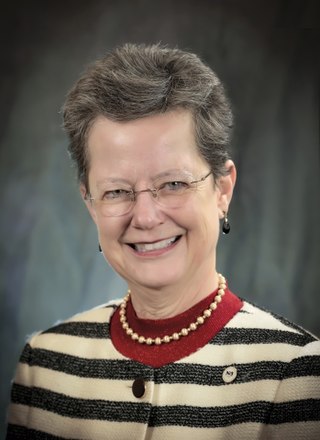
Julia Mae Phillips is an American physicist. She began her career in materials research on thin films on semiconductors and has transitioned into leadership roles in science policy. She currently serves on the National Science Board.

Randy Alan Bartels is an American investigator at the Morgridge Institute for Research and a professor of Biomedical Engineering at the University of Wisconsin–Madison. He has been awarded the Adolph Lomb Medal from the Optical Society of America, a National Science Foundation CAREER award, a Sloan Research Fellowship in physics, an Office of Naval Research Young Investigator Award, a Beckman Young Investigator Award, and a Presidential Early Career Award for Science and Engineering (PECASE). In 2020 and 2022, he received support from the Chan Zuckerberg Initiative to develop microscope technologies for imaging tissues and cells.